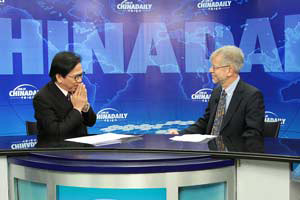Huawei putting US on hold
Updated: 2013-12-05 00:19
By Gao Yuan (China Daily)
|
|||||||||||
 |
|
A model displays Huawei Technologies Co Ltd’s Ascend tablet at a consumer electronics show in Chiba, Japan. The company started to explore the overseas market about a decade ago and now has 70,000 research and development staff globally. FENG WUYONG / XINHUA |
Huawei Technologies Co Ltd, China's largest maker of phone network equipment, is indicating it will abandon the United States carrier equipment market.
But analysts believe the company, based in Shenzhen, Guangdong, is eyeing European and Chinese markets for profit growth, while the US remains important to Huawei in the long term.
"Given the US carrier equipment market environment, Huawei is prioritizing its carrier business in markets that are open to competition, innovation and investment," said Huawei spokesman William Plummer.
"We remain committed to our customers, employees, investments and operations, and more than $1 billion in sales in the US. We stand ready to deliver additional competition and innovative solutions as desired by customers and allowed by authorities."
Plummer's statement came after Huawei CEO Ren Zhengfei told French media the company is pulling out of the US as it feels uncomfortable being stuck in the middle of a China-US trade skirmish.
"It's a good strategy to put the US aside for later exploration," said Ren, adding that the company will focus on the nation's mobile phone market.
"Huawei will not give up on the US market despite the unusual comment from the top executive," said Bryan Wang, head of Forrester Research Inc's China unit.
"The company will rush to serve any US telecom carrier once it gets an offer," Wang said. "It looks like Huawei is withdrawing, but it is mulling a strong counterattack in the US."
Wang suggested that the company should beef up its corporate business to spread the risk. Business with US telecom carriers accounted for 70 to 80 percent of Huawei's annual sales, according to Wang.
But some US government officials fretted that allowing Chinese companies, such as Huawei and ZTE Corp, to provide infrastructure products to local carriers would pose security risks.
Huawei and ZTE, both privately owned companies, have said repeatedly that their services do not have information safety problems.
On Nov 27, two US senators pressed the Obama administration to assess the intelligence risks posed to the US after Huawei was selected as a subcontractor for South Korea's telecom network.
Dianne Feinstein, D-Calif, chairman of the Select Committee on Intelligence, and Robert Menendez, D-NJ, who leads the Committee on Foreign Relations, sent a letter last week to Defense Secretary Chuck Hagel, Secretary of State John Kerry and James Clapper, the director of national intelligence.
The lawmakers expressed concerns that Huawei's involvement creates risks for the US-South Korea alliance, including for US troops based on the peninsula.
"Maintaining the integrity of telecommunications infrastructure is critical to the operational effectiveness of this important security alliance," the two senators wrote. "Reports that Huawei has been selected to develop and/or supply the Republic of Korea's advanced LTE telecommunications backbone raise serious questions and potential security concerns."
Related Stories
Huawei booms in Western Europe on innovation 2013-11-18 09:23
Huawei wins business award for services in UAE 2013-11-14 10:28
Huawei showcases 'Agile Network' in Barcelona 2013-11-14 10:01
Huawei calls for intl co-op in cyber security 2013-11-13 22:14
Huawei joins steering board of European tech platform 2013-11-09 11:21
Huawei has eye on 5G 2013-11-07 06:53
Today's Top News
Dialogue 'key to relations'
China eyes high-level FTAs network
Cameron gets language right on weibo
Japan launches security council
Value-added tax reform expands
UK stays open for Chinese investors
Air zone 'beneficial to safety'
Yuan overtaking euro in trade
Hot Topics
Lunar probe , China growth forecasts, Emission rules get tougher, China seen through 'colored lens', International board,
Editor's Picks

|

|

|

|

|

|





